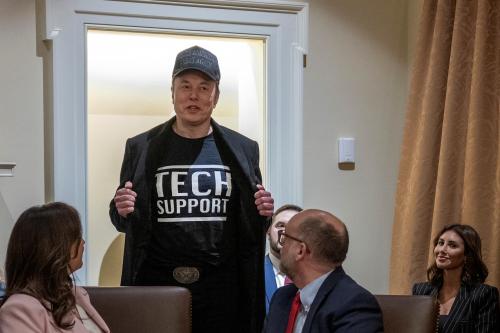While deputy assistant attorney general in the Justice Department’s antitrust division, Litan negotiated the consent decree with Microsoft that resulted from the department’s previous antitrust investigation of the company, in 1995. The present case began when the Justice Department charged that Microsoft had violated that 1995 agreement.
Litan now says he believes another conduct remedy of the sort agreed to in 1995 “just invites more lawyering.”
“Microsoft lawyers would immediately go to work going around it,” he said. “It’s like a dam. Leaks would spring, and you’d constantly be trying to stop them.
“So my proposal,” he added, “would start with breaking the company in two—one operating system company and another with everything else. But if you stop there, it’ll be fraught with all kinds of problems. You’d have to continually be supervising the operating system company” to make sure it did not pursue other anticompetitive practices.
“So therefore I’m attracted to the idea of breaking the operating system company into three equal companies—all with identical properties and activities. And then you let these three operating system companies loose to compete.”
Gates, Microsoft’s chairman, would choose which company he would lead—one of the three operating-system companies, or the fourth one holding all of Microsoft’s other products and services.
But the company’s other senior leaders could not go with Gates. They would have to be spread among the other new companies. And the $18 billion in cash reserves Microsoft holds would be divided among the four new companies, too.
Critics of this idea, or variations of it, say they worry that consumers would soon be faced with incompatible operating systems. Litan said that would not occur in the short term because the companies would start with the same operating system code.
And if, as expected, the systems diverged in the future, other companies would spring up to write what he called “bridging programs” that would allow software for one operating system to work with the others.
“With these companies competing with each other, you’d get more innovation, and that’s the goal,” he said. “It may be that the trade for that” is the risk of incompatibility.
In the end, Litan concluded, “the operating system market will probably collapse over time.”
“There may be just one left, one winner,” he said. “But whoever won would be severely chastened by this case.”
The Brookings Institution is committed to quality, independence, and impact.
We are supported by a diverse array of funders. In line with our values and policies, each Brookings publication represents the sole views of its author(s).


Commentary
What to Do About Microsoft? Antitrust Experts Offer Opinions
November 15, 1999